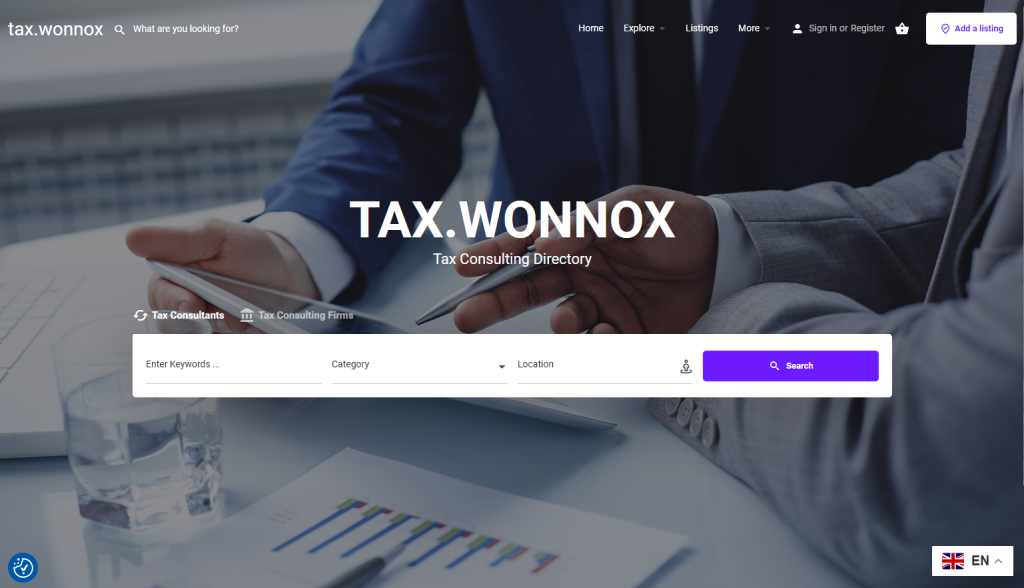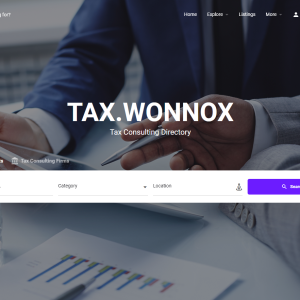
- Direct message
- Leave a review
- Bookmark
- Share
- Report
- prev
- next
Description
A tax consultant listing or profile in a web directory under the "taxes" category is a powerful tool for showcasing expertise and services to individuals and businesses seeking professional tax advice and assistance. A well-crafted listing should provide a clear overview of the consultant's skills, experience, and approach to working with clients, helping potential clients decide if the consultant is the right fit for their needs. Below are the key features that should be included in a tax consultant profile to make it stand out and effectively attract clients:
1. Profile Overview:
Consultant’s Full Name and Title: The tax consultant’s name, along with any professional designations like “CPA” (Certified Public Accountant), “EA” (Enrolled Agent), or “Tax Advisor,” should be prominently displayed.
Business Name: If the consultant operates under a business name or firm, it should be clearly mentioned to distinguish between an independent consultant and a larger practice.
Tagline or Slogan: A concise tagline that summarizes the focus of the services, such as “Maximizing Your Tax Refund” or “Expert Tax Strategies for Small Businesses,” helps grab attention.
About Me/Us: A brief description of the consultant’s background, philosophy, and values helps to establish their credibility and personality. This is where potential clients can learn about the consultant’s approach and what sets them apart.
2. Contact Information:
Office Address: The physical address of the consultant’s office helps clients understand where they can meet in person, which is especially important for those who value face-to-face consultations.
Phone Number: A direct phone number makes it easy for clients to reach out for inquiries, appointments, or consultation scheduling.
Email Address: A professional email address provides a point of contact for clients who prefer to initiate communication digitally.
Website URL: A link to the consultant’s website allows potential clients to learn more about the services offered, read articles or resources, and explore other aspects of the consultant’s practice.
Social Media Links: Links to social media profiles like LinkedIn can provide a more dynamic view of the consultant’s professional activities and client interactions.
3. Services Offered:
Tax Preparation Services: A detailed list of tax preparation services offered, such as individual tax returns, corporate tax filings, and self-employed tax assistance, helps potential clients find the right match for their needs.
Tax Planning and Strategy: Highlighting services like tax planning, savings strategies, and year-round tax advice positions the consultant as a proactive advisor, not just a tax preparer.
Specialized Tax Services: If the consultant specializes in areas like estate planning, international tax issues, or cryptocurrency taxation, this should be prominently listed to attract clients with specific needs.
Audit Representation: Mentioning services like IRS audit representation or assistance with tax disputes adds value, especially for clients facing complex tax situations.
4. Industry Focus:
Business Sector Specialization: If the consultant has experience working with particular industries (e.g., tech startups, healthcare, real estate, freelancers), this should be mentioned to attract clients seeking industry-specific expertise.
Small Business Services: Highlighting services for small businesses, such as LLC or S-corporation tax planning, can help attract entrepreneurial clients who need tailored support.
Individual Taxpayer Services: For consultants who work extensively with individual taxpayers, emphasizing services like retirement tax planning or education-related tax credits can be appealing.
5. Professional Background:
Education and Credentials: Detailing the consultant’s educational background, such as degrees in accounting or finance, adds credibility to their profile.
Professional Certifications: Mentioning certifications like CPA (Certified Public Accountant), EA (Enrolled Agent), or other tax advisory credentials is crucial, as these are key indicators of expertise and professional standing.
Years of Experience: Highlighting the number of years the consultant has been practicing helps clients assess the depth of their experience.
6. Client Services:
Consultation Details: Information about whether the consultant offers free initial consultations or paid sessions, and how to schedule these, helps manage client expectations.
Virtual Services: Describing options for virtual consultations through video calls or online portals can attract clients who prefer digital interactions or are located outside the consultant’s immediate area.
Service Hours: Including availability for evening or weekend appointments can be beneficial for clients who need flexibility in scheduling.
7. Client Testimonials and Reviews:
Client Feedback: Including testimonials from satisfied clients provides social proof of the consultant’s competence, client service, and expertise in handling various tax situations.
Ratings: Displaying ratings (e.g., out of 5 stars) or certifications from review platforms (like Google Reviews or Yelp) can further build trust with potential clients.
Professional Endorsements: Endorsements from other professionals, such as accountants or business consultants, add credibility to the consultant’s expertise.
8. Case Studies and Success Stories:
Case Studies: Providing brief, anonymized examples of past successes, such as “Helped a small business save 20% on taxes through strategic planning,” can illustrate the consultant’s ability to deliver results.
Client Achievements: Highlighting specific outcomes, like resolving tax issues or achieving significant tax savings, helps potential clients understand the value of the consultant’s services.
9. Approach and Philosophy:
Tax Advisory Approach: A description of the consultant’s approach to working with clients, such as “client-centered,” “results-driven,” or “holistic tax planning,” helps potential clients understand how the consultant operates.
Commitment to Clients: Emphasizing values like “transparent pricing,” “dedicated to minimizing tax liabilities,” or “year-round availability for questions” can set the consultant apart.
10. Pricing and Fee Structure:
Fee Transparency: Providing information about the consultant’s fee structures, such as hourly rates, flat fees, or project-based pricing, helps clients understand the financial commitment involved.
Payment Methods: Listing accepted payment options (credit cards, digital payments, etc.) and any available payment plans can attract clients seeking financial flexibility.
Value-Based Pricing: Mentioning value-based pricing models, such as fees based on tax savings achieved, can appeal to clients looking for results-oriented services.
11. Call to Action (CTA):
Engagement Prompts: A strong CTA encourages potential clients to take the next step, such as “Contact Us for a Free Tax Review” or “Schedule Your Year-End Tax Planning Session.”
Online Booking Link: If the consultant offers online appointment scheduling, including a link for clients to book directly can simplify the process.
12. Certifications, Awards, and Recognitions:
Awards and Honors: Highlighting awards like “Top Tax Advisor” or recognitions from local business groups can add prestige and differentiate the consultant.
Professional Associations: Mentioning memberships in organizations like the National Association of Enrolled Agents (NAEA) or the American Institute of CPAs (AICPA) helps establish the consultant’s credibility.
13. SEO and Keyword Optimization:
Keyword Integration: Using relevant keywords like “Tax Consultant for Small Businesses” or “Expert Tax Advisor in Los Angeles” ensures that the profile is easily discoverable in search results.
Tags and Categories: Proper categorization under specific services (e.g., “Individual Tax Planning,” “Business Tax Advisor”) helps the profile appear in relevant searches.
14. Visual Elements:
Professional Headshot: Including a professional headshot makes the profile more personal and approachable, building trust with potential clients.
Business Logo: If the consultant operates under a business name, including the logo can enhance brand recognition.
Office Photos: Photos of the office environment can help create a sense of transparency and professionalism.
15. Additional Resources:
Tax Tips and Blog: Linking to articles or blog posts on relevant tax topics can position the consultant as an expert and provide valuable information to potential clients.
Downloadable Resources: Offering guides like “Year-End Tax Planning Checklist” or “Top Tax Deductions for Freelancers” can attract potential clients seeking useful insights.
16. Community Involvement and Pro Bono Work:
Community Engagement: Highlighting the consultant’s involvement in local events, seminars, or volunteer tax preparation services can appeal to clients who value community-focused professionals.
Pro Bono Services: If the consultant offers free or discounted services to non-profits or low-income individuals, mentioning this can enhance the profile’s appeal and reputation.
A tax consultant listing in a web directory should provide a comprehensive view of the consultant’s expertise, professionalism, and approach to tax services. With detailed information about their services, client feedback, and a strong emphasis on transparency, the profile can attract a wide range of clients—from individuals seeking help with their annual returns to businesses looking for strategic tax planning. By offering a clear and engaging presentation, the profile helps potential clients make an informed decision when choosing a tax advisor.

Add a review